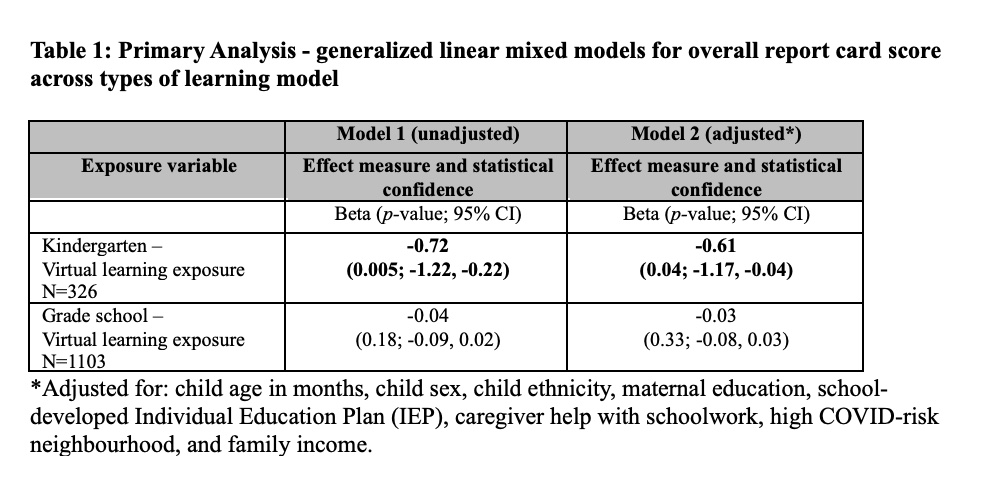Developmental and Behavioral Pediatrics
Session: Developmental and Behavioral Pediatrics 4: Potpourri
599 - The association between learning models during COVID-19 and learning outcomes in children
Sunday, May 5, 2024
3:30 PM - 6:00 PM ET
Poster Number: 599
Publication Number: 599.2029
Publication Number: 599.2029

Jessica A. Omand, PhD (she/her/hers)
Assistant Professor
Toronto Metropolitan University
York, Ontario, Canada
Presenting Author(s)
Background: COVID-19 was declared a global pandemic in March 2020, and schools were closed worldwide as a disease containment strategy. In Ontario, Canada, schools were closed for in-person learning for a minimum of 27 weeks with some children attending school virtually throughout the pandemic. Learning model may have differentially impacted children’s school performance.
Objective: The primary objective was to determine whether learning model (virtual or in-person) was associated with overall report card score among children in kindergarten and grade school (grades 1-6). The secondary objectives were to determine whether learning model was associated with report card domains and if the above associations were modified by household family income.
Design/Methods: Children ages 4-10 years were enrolled into the TARGet Kids! practice-based research network between November 2020 and July 2022 in Ontario, Canada. Repeated parent-completed questionnaires were collected on sociodemographic information, learning model and the most recent report card based on curriculum outcomes. We used generalized linear mixed models for overall report card score and proportional-odds models for ordinal data for specific report card domains across types of learning model in 1) kindergarten and 2) grade school. An interaction test was used to determine whether family income was an effect modifier.
Results: A total of 500 children with 1429 observations (326 and 1103 kindergarten and grade school report cards, respectively) were included. Of these, 52% were male, mean age 7.5 years, and 26% attended school virtually. Mean overall report card score was 9.9 (SD 3.0) for kindergarten and 15.4 (SD 3.7) for grade school. Virtual learning was associated with a lower report card score in kindergarten -0.61 (95% CI, -1.17 to -0.04; p=0.04) but not grade school -0.03 (95% CI, -0.08 to 0.03; p=0.33). The odds of being in a lower report card category was higher in the virtual compared to in-person group for the ‘self-regulation and well-being’ and ‘belonging and contributing’ domains of development in kindergarten 1.79 (p=0.038; 95% CI 1.03 - 3.10) and 2.48 (p=0.04; 95% CI 1.04 - 5.95), respectfully; no evidence of differences was found in grade school. Income did not modify this relationship.
Conclusion(s): Virtual learning was associated with lower report card scores in children in kindergarten but not in grade school. This is consistent with research suggesting low engagement in virtual learning in kindergarten. Determining how learning model impacted school performance may help inform recovery strategies for improving education outcomes.

